Food for prostate inflammation includes almond, apricot, avocado, bell pepper, cauliflower, black seed oil, pumpkin seed, sesame seed, orange, papaya, soy, tomato, and walnut.
|
Morning |
Herbal tea/soy milk |
|
Breakfast |
Rava uthappam + groundnut chutney |
|
Salad |
Pumpkin seed spinach salad |
|
Mid-morning |
Carrot Pineapple juice |
|
Lunch |
Brown rice + masala bhindi + shahi egg curry |
|
Evening |
Mushroom and potato soup |
|
Dinner |
Chapati + aloo vindaloo |
|
Bedtime |
Ashwagandha tea |
Consult 19 years experienced Chief Nutritionist Vasanthi for expert advice and a personalized diet plan. In-person consultation at HSR, Koramangala, Bellandur, Haralur, and video consultation across India.
- Consultation INR 750
- 1 Week personalized diet plan INR 2000
- 1 Month personalized diet plan INR 4000
- 3 Months personalized diet plan INR 9000
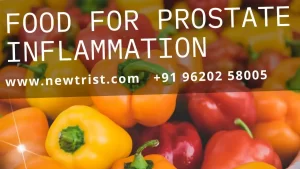
Table of Contents
Prostate inflammation
Prostate inflammation often referred to as “Prostatitis” is characterized by swelling of the prostate gland that produces the seminal fluid.
It is caused when bacteria enter the prostate from the urinary tract. Some of the common signs of prostate inflammation are
- Pain or burning sensation while urinating
- The presence of blood in the urine
- Frequent urination during the night
- Difficulty in urinating
A urine test may show the presence of bacteria and other infections in the urine.
Prostate inflammation diet
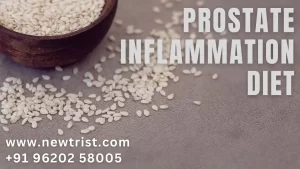
The zinc content is high in sesame seeds, shellfish, nuts, and legumes. Zinc is crucial for the health of the prostate.
Zinc levels in the bodies of men with BPH (Benign Prostatic Hyperplasia) or prostate cancer are typically up to 75% lower than those with healthy prostates.
Zinc from food sources is more easily absorbed than zinc from supplements. Eat sesame seeds as a snack to benefit your body.
Additionally high in zinc are almonds, adzuki beans, and pumpkin seeds.
Foods that help prostate inflammation
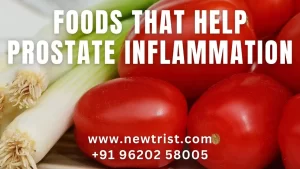
Obesity may be one of the risks of developing an enlarged prostate.
Increasing omega-3s and exercising can help reduce obesity and weight gain. Salmon contains a lot of omega-3 fatty acids.
Walnuts, chia seeds, flax seeds, and canola oil are also rich sources of omega-3 fatty acids.
These beneficial fats can shield you from cardiovascular disease, cancer, rheumatoid arthritis, inflammation, and weight gain.
Pumpkin seeds may help with BPH management.
Vegetables rich in vitamin C may help prevent BPH. The vitamin C content of bell peppers is high.
Nearly 200 percent of your recommended daily allowance of vitamin C can be found in one cup of raw bell peppers.
You might also include the following veggies in your diet because they are also high in vitamin C: Broccoli, cauliflower, kale, and Brussels sprouts.
Lycopene, a prominent pigment that gives tomatoes their vibrant red color, is abundant in tomatoes.
Prostate cancer risk may be reduced by lycopene. According to the National Cancer Institute, it can also benefit men who have BPH.
Lycopene was found to reduce the progression of BPH.
Lycopene aids in reducing the PSA (Prostate Specific Antigen), which is linked to prostate cancer, BPH, and prostate inflammation.
To increase absorption, simply pair your lycopene-rich foods with healthy fats, such as avocado, almonds, oil, or butter.
One can get lycopene from:
- Tomatoes
- Watermelon
- Apricots
- Pink grapefruit
- Papaya
The plant sterol beta-sitosterol, which is abundant in avocados, is thought to lessen BPH symptoms.
Men who take beta-sitosterol supplements report improved urinary flow and reduced volume of residual pee.
Besides avocados, other foods rich in beta-sitosterol include:
- Pumpkin seeds
- Wheat germ
- Soybeans
- Pecans
BPH risk can be reduced by increasing vegetable intake. Green leafy vegetables are particularly significant as they are rich in antioxidants.
Broccoli and other cruciferous vegetables lower the chance of prostate issues, such as BPH and prostate cancer.
Include onions and garlic regularly in your diet to reduce your risk of developing BPH.
Natural remedies involve onions and garlic that help boost your immune system and fight illness frequently.
A prior study found that soybean isoflavones slow the development of BPH. A more recent study, however, contends that soy simply slows prostate cancer cell proliferation.
Soy isoflavones can aid with the symptoms and indicators of BPH-related lower urinary tract issues.
Some of the whole soy foods that contain soybean isoflavones are:
- Soymilk
- Tempeh
- Edamame or cooked soybeans
- Roasted soybeans
- Soy yogurt
Best food for prostate inflammation

Salmon food for prostate inflammation
Omega-3 fatty acids, which are abundant in salmon and serve to prevent and reduce inflammation in the body, are good sources of healthy fats.
These kinds of lipids are also abundant in other cold-water fish, including sardines and trout.
Lycopene, an antioxidant that may help prostate gland cells, is abundant in tomatoes.
Lycopene is released and made more available to the body when tomatoes are cooked, such as in tomato sauce and soup.
Berries food for prostate inflammation
Strawberries, blackberries, blueberries, and raspberries are great sources of antioxidants that help in the removal of free radicals from the body.
Free radicals are the results of chemical reactions that take place inside the body and over time, they can harm the body and lead to disease.
Broccoli food for prostate inflammation
Sulforaphane, a substance found in broccoli and other cruciferous vegetables like bok choy, cauliflower, Brussels sprouts, and cabbage, is a powerful antioxidant.
This is said to prevent prostate cancer by targeting cancer cells.
Nuts food for prostate inflammation
Nuts are a good source of trace mineral zinc. The prostate has large levels of zinc, which is known to assist maintain a healthy balance between DHT and testosterone.
Shellfish, sesame seeds, and legumes are some of the rich sources of zinc.
Citrus food for prostate inflammation
Vitamin C, which is abundant in oranges, lemons, limes, and grapefruits, may aid to shield the prostate gland.
Foods that cause prostate inflammation
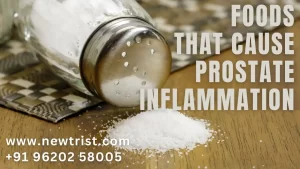
Red meat:
Avoiding red meat may aid to improve prostate health. Eating red meat every day triples your risk of developing an enlarged prostate.
Dairy:
Similar to meat, regular dairy consumption has been associated with a higher risk of BPH.
Butter, cheese, and milk consumption should be reduced or eliminated to aid with BPH symptoms.
Caffeine:
A frequent urge to urinate may be due to the diuretic effect caused by caffeine. Limiting your intake of coffee, tea, soda, and chocolate may help with BPH urinary symptoms.
Sodium:
High salt consumption may exacerbate BPH-related symptoms in the urinary tract.
It is beneficial to follow a low-sodium diet and avoid processed foods and not include salt in meals.
Black seed oil for prostate inflammation
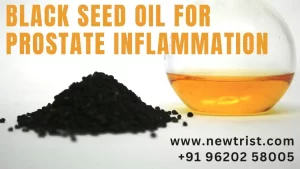
Antioxidants, plant components that help shield cells from harm brought on by unstable molecules known as free radicals, are abundant in black seed oil.
Antioxidants are crucial for good health since they help reduce inflammation and guard against diseases including cancer, heart disease, and Alzheimer’s.
Black seed oil is particularly abundant in thymoquinone, a powerful antioxidant, and anti-inflammatory. This support brain function and help treat several kinds of cancer.
When you have asthma, the muscles surrounding your airways tighten, and the lining of your airway swells making it difficult to breathe.
Black seed oil, and more especially the oil’s thymoquinone, may aid in the treatment of asthma by lowering inflammation and loosening airway muscles.
In one trial, ingesting 500 mg of black seed oil twice daily for four weeks significantly improved asthma control in 80 adults.
Black seed oil may assist people with obesity, metabolic syndrome, or type 2 diabetes to lower their body mass index (BMI).
In one 8-week research, 90 obese women between the ages of 25 and 50 received a low-calorie diet and 3 gms of black seed oil daily, divided into 1 gm at each meal.
Black seed oil users noticeably dropped more weight and waist circumference than those receiving a normal diet by the end of the study.
Triglyceride and LDL (bad) cholesterol levels were significantly improved in the oil group as well.
Effects against cancer:
Thymoquinone in black seed oil has been proven in test-tube tests to help prevent the growth and spread of certain types of cancer cells.
Lessens rheumatoid arthritis symptoms:
Black seed oil may assist persons with rheumatoid arthritis to reduce joint inflammation because of its anti-inflammatory properties.
Lowers blood sugar levels:
Diabetes is a major risk factor for renal, cardiac, and other diseases.
Regular consumption of black seeds has been found to reduce fasting blood sugar levels and hemoglobin A1c levels. The black seed oil also has the same effect on diabetes.
Lowers blood pressure:
Hypertension and high cholesterol levels are the risk factors for heart diseases.
2-3 gm of black seeds consumed twice daily for 2 months have shown a significant reduction in blood pressure and total cholesterol levels.
Antifungal:
Black seed oil has antifungal properties. It may specifically defend against Candida albicans, a yeast that can cause candidiasis.
Foods to reduce prostate inflammation
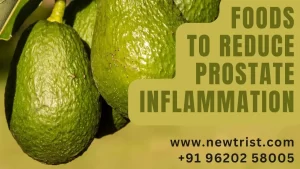
Include five servings of vegetables and fruits every day. Go for deep bright color fruits and vegetables food for prostate inflammation.
Whole-grain food for prostate inflammation. Choose bread, pasta, and cereals made from whole grains instead of refined ones.
Limit your consumption of red meat, including lamb, goat, and processed meats, such as bologna and hot dogs.
Lean protein food for prostate inflammation. Fish, skinless poultry, beans, and eggs are healthier sources of protein.
Choose healthy fats such as olive oil, nuts (almonds, walnuts, pecans), and avocados. Limit saturated fats from dairy and other animal products.
Avoid partially hydrogenated fats (trans fats), which are in many fast foods and packaged foods.
Avoid sugars and sweetened drinks, such as sodas and commercially sold fruit juices that may contain added sugars. Eat sweets as an occasional treat.
Cut down on salt. Choose foods low in sodium. Read food labels and limit canned, processed, and frozen foods that contain remarkable levels of sodium.
Watch your plate for portion sizes. When you feel full, stop eating slowly.